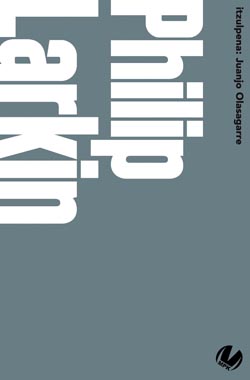
Ergel zaharrak
Ergel zaharrok, zer uste ote dute gertatu zaiela
horrela egoteko? Helduago direla uste ote dute
lerdea darielako, pixa gainean egiten dutelako
eta goizean nork deitu duen gogoratzen ez dutelako?
Edo uste ote dute nahi izate hutsarekin dantza betean
aritu ziren gauera egin dezaketela atzera, edo ezkontza egunera
edo beso pikotako irailen batera?
Edo iruditzen ote zaie ez dela ezer aldatu
eta beti elbarri eta ezindu gisa portatu direla,
edo eserita, amets etengabean egon direla
argiaren joan-etorriei so? Ez badute hala uste (besterik ezin)
zergatik ez dute garrasi egiten?
Hiltzean hautsi egiten zara: zu zareneko puskek
betirako alde egiten dute bata bestearengandik
lekukorik gabean. Bai, ahanztura baino ez da:
lehen ere bagenuen, baina orduan pasakorra zen
eta etengabean egiten zuen bat hemen-egote-lore
hostotsua ernetzeko joran behinenarekin. Gerora
ezin dituzu beste zerbait egonen delako plantak egin. Hara hasiera:
nor ari den aditu ez, nola jakin ez; aukera ahalmena
galdua. Itxurak salatzen ditu:
ile urdindua, apo eskuak, pasa zimurtu aurpegia—
Nola egin dezakete ez ikusiarena?
Zahartzea da, agian, buruan
gela argituak izan eta haietan jendea, antzezten.
Jende ezaguna, ezin izenekin akordatu, ordea; itzalak,
berreskuratu galera sakonak balira bezala, ate ezagunetan kukuka,
lanpara jiraka, eskaileretan irribarrez, apaletatik
liburu ezaguna hartzen; edo batzuetan, besterik gabe, gelak, hutsik,
sillak eta sutondoa piztuta,
sasia haizearekin kulunka leihoan, edo eguzkiaren
adiskidantza xumea hormaren kontra udako arratsalde
bakarti eta atertu berrian. Hor bizi dira:
ez hemen eta ez orain, dena gertatu zen noizbait horretan baizik.
Horregatik dute
absentzia aztoratu itxura hori, nahiz eta hara nahian
hemen izan. Izan ere, gelak urrunduz doaz, hotz
ezgai bat utziz, arnas hartzearen neke eta negar etengabea,
eta haiek hor kuzkurturik
Ahitze mendiaren azpian, ergel zaharrok, zein gertu dagoen
ohartzeke. Beharbada honek lasaitzen ditu:
edonondik begi-bistan dugun tontorra
zorua dela jada haiendako. Ez ote dute ikusten
zerk geldiarazten dituen, nola finituko den? Gauez ere ez?
Jende arrotza ailegatzean? Ez eta behin ere,
bigarren haurtzaro horretan guztian? Ederki,
jakinen dugu, jakinen dugunez.
The Old Fools
What do they think has happened, the old fools, / To make them like this? Do they somehow suppose / It’s more grown-up when your mouth hangs open and drools, / And you keep on pissing yourself, and can’t remember / Who called this morning? Or that, if they only chose, / They could alter things back to when they danced all night, / Or went to their wedding, or sloped arms some September? / Or do they fancy there’s really been no change, / And they’ve always behaved as if they were crippled or tight, / Or sat through days of thin continuous dreaming / Watching light move? If they don’t (and they can’t), it’s strange: / Why aren’t they screaming? // At death, you break up: the bits that were you / Start speeding away from each other for ever / With no one to see. It’s only oblivion, true: / We had it before, but then it was going to end, / And was all the time merging with a unique endeavour / To bring to bloom the million-petalled flower / Of being here. Next time you can’t pretend / There’ll be anything else. And these are the first signs: / Not knowing how, not hearing who, the power / Of choosing gone. Their looks show that they’re for it: / Ash hair, toad hands, prune face dried into lines — / How can they ignore it? // Perhaps being old is having lighted rooms / Inside your head, and people in them, acting. / People you know, yet can’t quite name; each looms / Like a deep loss restored, from known doors turning, / Setting down a lamp, smiling from a stair, extracting / A known book from the shelves; or sometimes only / The rooms themselves, chairs and a fire burning, / The blown bush at the window, or the sun’s / Faint friendliness on the wall some lonely / Rain-ceased midsummer evening. That is where they live: / Not here and now, but where all happened once. / This is why they give // An air of baffled absence, trying to be there / Yet being here. For the rooms grow farther, leaving / Incompetent cold, the constant wear and tear / Of taken breath, and them crouching below / Extinction’s alp, the old fools, never perceiving / How near it is. This must be what keeps them quiet: / The peak that stays in view wherever we go / For them is rising ground. Can they never tell / What is dragging them back, and how it will end? Not at night? / Not when the strangers come? Never, throughout / The whole hideous inverted childhood? Well, / We shall find out.